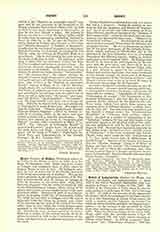

Henry of Langenstein (HENRY OF HESSE THE ELDER), theologian and mathematician; b. about 1325 at the villa of Hainbuch (Hembuche), near Langenstein in Hesse; d. at Vienna, February 11, 1397. He studied at the University of Paris, where he also became professor of philosophy in 1363, and of theology in 1375. In 1368, at the occasion of the appearance of a comet, which the astrologers of his times claimed to be a sure foreboding of certain future events, he wrote a treatise entitled “Quaestio de cometa”, in which he refutes the then prevalent astrological superstitions. At the instance of the university he wrote three other treatises on the same subject, completed in 1373. When the Western Schism broke out in 1378, Henry sided with the lawfully-elected Urban VI against Clement VII, and wrote various treatises in defense of the former. In 1379 he composed “Epistola pacis” (see “Helmstadter Program”, 1779 and 1780) in which, under the form of a disputation between an Urbanist and a Clementine, he advocates the suppression of the schism by way of a general council or a compromise. In his “Epistola concilii pacis”, composed in 1381, and based on a similar work, “Epistola Concordiae” of Conrad of Gelnhausen, he urges still more strongly the necessity of a general council and severely criticises the many abuses that were permitted to go on within the Church. These two treatises of Henry, and the “Epistola Concordiae” of Conrad, formed the basis of a discourse delivered by Cardinal Pietro Philargi, the future Alexander V, at the first session of the Council of Pisa (March 26, 1409); see Bliemetzrieder in “Historisches Jahrbuch” (Munich, 1904), XXV, 536-541. Henry’s “Epistola concilii pacis” is printed in von der Hardt’s “Concilium Constantiense”, II, 1, 3-60, with the exception of the first and the second chapter, which were afterwards published by the same author in “Discrepantia mss. et editionum” (Helmstadt, 1715), 9-11.
When in 1382 the French court compelled the professors of the Paris university to acknowledge the antipope Clement VII, Henry left the university and spent some time at the Cistercian monastery of Eberbach near Wiesbaden. A letter which he wrote here to Bishop Eckard of Worms, and which bears the title “De scismate” was edited by Sommerfeldt in “Historisches Jahrbuch” (Munich, 1909), XXX, 46-61. Another letter which he wrote here to the same bishop, on the occasion of the death of the bishop’s brother, is entitled “De contemptu mundi” and was edited by Sommerfeldt in “Zeitschrift fur kath. Theologie” (Innsbruck, 1905), XXIX, 406-412. A second letter of condolence, written about 1384, was edited by Sommerfeldt in “Hist. Jahrbuch” (Munich, 1909), XXX, 298-307. Following the invitation of Albert III, Duke of Austria, he came to the University of Vienna in 1384, and assisted in the foundation of a theological faculty. Here he spent the remainder of his life, teaching dogmatic theology, exegesis, and canon law, and writing numerous treatises. He refused an episcopal see which was offered him by Urban VI. Roth (see below) ascribes to him seven works on astronomy, eighteen historico-political treatises on the schism, seventeen polemics, fifty ascetical treatises, and twelve epistles, sermons and pamphlets. Among his printed works the most important are: “De conceptione”, a defense of the Immaculate Conception (Strasburg, 1500); “Contra disceptationes et praedicationes contrarias fratrum Mendicantium”, another defense of the Immaculate Conception against some of the Mendicants (Milan, 1480; Basle, 1500; Strasburg, 1516); “Speculum animae” or mirror of the soul, an ascetical treatise edited by Wimpfeling (Strasburg, 1507); “Secreta Sacerdotum”, treating of certain abuses in the celebration of Mass, edited by Lochmayer (Heidelberg, 1489), and often thereafter; “De contractibus emtionis et venditionis”, a very important work, on the politico-economical views of his times, published among the works of Gerson (Cologne, 1483), IV, 185-224. Other valuable treatises are: “Summa de republica”, a work on public law; and “Cathedra Petri”, a work on ecclesiastical policy, both still unedited.
MICHAEL OTT

